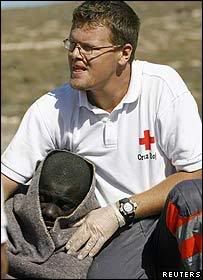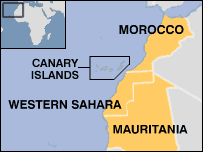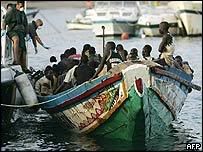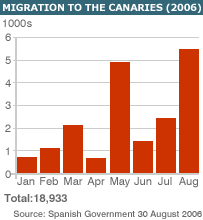
Austin Wainwright, a worker with the Spanish Red Cross, describes helping African migrants who arrive in the Canary Islands after days at sea in small boats.
The basic story most of the people tell is that they would rather die trying to make it to Europe than to stay in their country.
They say they have no future, because work is very scarce and they need to feed their families. They think life will be easy here if they can get a job. They say they are doing what any father or brother would do to protect his family.
To get here from Mauritania takes about four to six days. From Senegal it can be two weeks, more if they get lost. In one case it was about 20 days.
Most come in open wooden boats. One we had this morning was carrying 98 people, though there have been up to 170.
There is no shelter, except sometimes a plastic tarpaulin stretched over part of the boat. They are packed in with no room to stretch out. There are no cooking facilities - or only a small stove - and no bathroom, just a bucket.
Infections
Some have nasty salt sores caused by wet clothing rubbing continuously for many, many days.
Some have nasty infected wounds, which can be caused by something as small as a splinter. They may be suffering from hypothermia or dehydration.
We provide humanitarian and medical aid, either at the harbour at Los Cristianos, or on the beach.
We provide clothing kits, containing a track suit, a T-shirt, socks, shoes, underwear and a blanket. Also water, hot drinks, biscuits. Some people have not drunk for two days. Others say they have gone five or six days without eating, or even 10 days.
We have a pneumatic field hospital where we provide pre-hospital treatment. In some cases the migrants are hospitalised.

We have seen grown men start crying or kissing the ground when they finally touch land. It is unlikely they knew in advance how long and dangerous the journey would be. A lot of them cannot actually swim. We have had boats arriving with dead bodies on board.
Savings
On the other hand, they often know they are going to face problems. They are met by police on the quayside, or on the beach. In some cases they are intercepted by naval boats, or Guardia Civil patrol boats.
There was one case recently where someone said: "We have seen this one before." I think he was from Senegal. He had been here about three months previously, and had reappeared.

They originate from Mali, Mauritania, Gambia, Ghana, Morocco - anywhere in West Africa.
About 99% are male. We have seen thousands of people here in Tenerife, and only about 10 of them have been women.
Women are more likely to travel to Fuerteventura, even pregnant women, or to the southern coast of Spain. About 5-10% are minors. This morning we had a boy of 12.
They don't tell us about money, but we think they sometimes come in organised groups, paying 500 or 600 euros per person, which for them is probably about six months' or a year's savings.
Stress
When they have recovered they are taken to the police headquarters for questioning, where they may stay for 72 hours.
They can be held in internment centres for up to 40 days, and from there they are sent to the mainland, or released, or sent back to their country of origin.

In March there were just three of us, but now I am responsible for two teams of five people.
It's extremely stressful, especially taking someone off a boat in a body bag - someone who has died trying to help his family. It makes you think how lucky we are, here in Europe.
On the other hand, it is extremely rewarding to be able to help somebody in these conditions - to provide water or a hot drink. We have volunteers, some of whom work with us all night, then go to work the next day without sleeping.

No comments:
Post a Comment